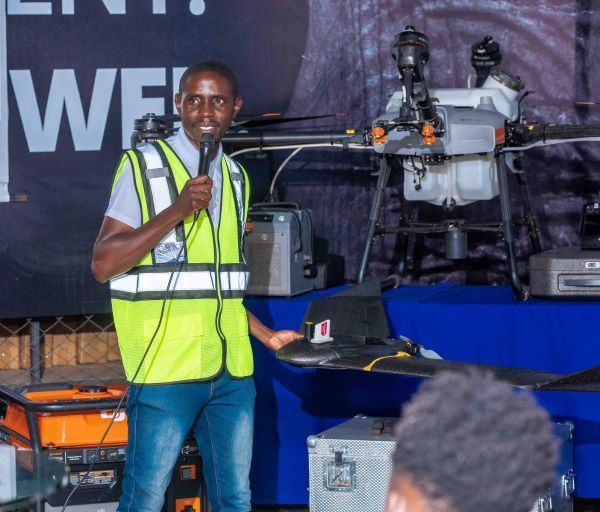Farmers in Zimbabwe often face challenges such as low crop yields, pests, and diseases that affect their harvests.
However, technological advancements particularly in the fourth industrial revolution (4IR) emerging technologies such as drones, robotics, artificial intelligence, data science have made it possible to overcome some of these challenges and leapfrog the infrastructure gap.
In an interview at the sidelines of the on-going Agricultural Dealers and Manufacturers Association (ADMA) Agrishow, Zimbabwe biggest agricultural showcase underway in Harare, Tawanda Chihambakwe, the director of Precision Aerial Group, said the use of advanced technologies in precision agriculture and smart farming has produced several benefits for local farmers.
“Crop farming drones are unmanned aerial vehicles that can be programmed to fly over crops and spray them with various crop chemicals from pesticides to fertilisers and even foliar sprays. Drones offer several benefits over traditional manual spraying methods like handheld knapsacks and tractor-drawn boom sprayers,” he said.
He added the use of drones in Zimbabwe and most countries in Africa was regulated through laws and regulations that govern their safe and legal use for commercial purposes.
“”A crop spraying drone is an aircraft and the operation of drones for agricultural crop spraying can only be done by trained and licensed operators. Most crop spraying drones can weigh in excess of 50kg with a full payload and look like a small helicopter.
“In Zimbabwe, the pioneer and leading commercial drone operator for agricultural applications is Precision Aerial, and is a certified operator and also has a civil aviation authority approved training school that trains and certifies drone pilots and also offers specialised courses on drones for agriculture,” he added.
Chihambakwe said before 2022, most farmers in Zimbabwe were skeptical of using drones for crop spraying and did not view them as a viable alternative to traditional spraying methods.
He added; “Crops that are popular for aerial crop spraying with drones for local farmers in Zimbabwe and through the Southern Africa region include; maize, sugarcane, soya beans, sorghum, wheat, tobacco, cotton and sunflowers.
“Crop spraying drones also provide an essential service to spray fruits and crops grown in orchards such as citrus, macadamia nuts, blueberries and tea.”
Chihambakwe said some of the benefits of using drones are that spraying cover a larger area in a shorter time than traditional methods.
“In Zimbabwe, farmers have large plots of land, and manually spraying crops can take several days. With crop spraying drones, farmers can cover large areas in a matter of hours. Using drones to spray crops reduces the amount of water required for spraying by almost 90 percent compared to traditional methods.
“The rise in the use of crop spraying drones in Zimbabwe is helping farmers to overcome some of the challenges they face and improve their profitability and sustainability,” he added.








